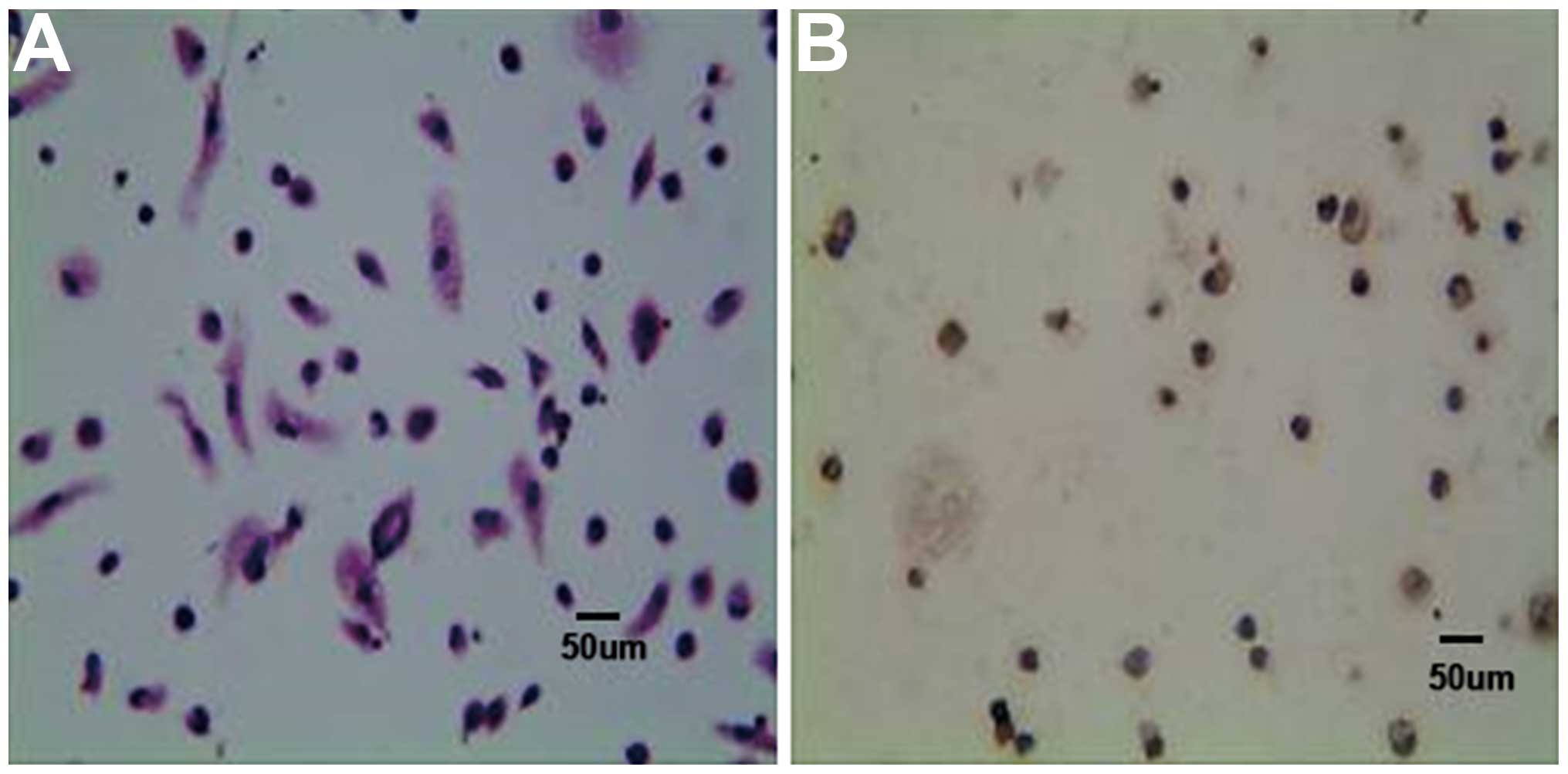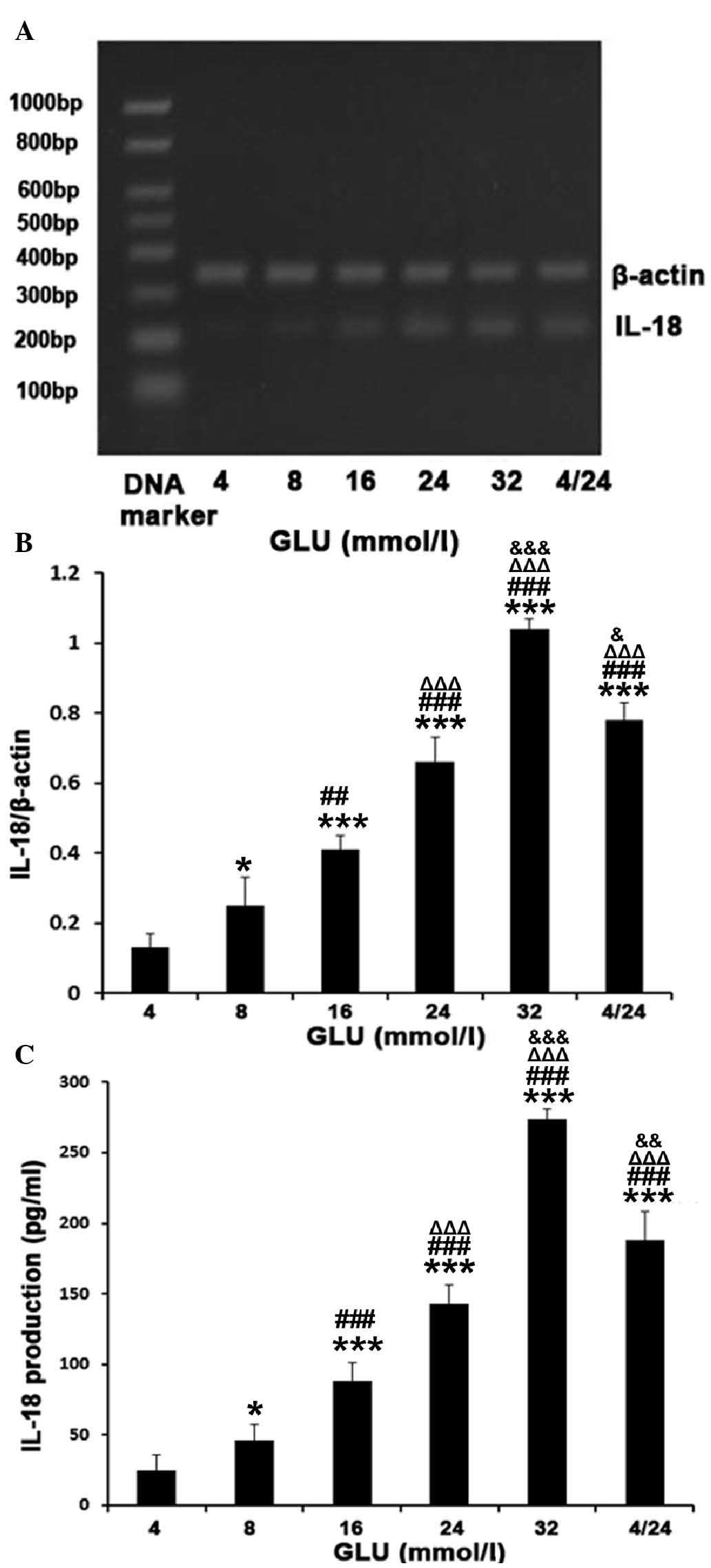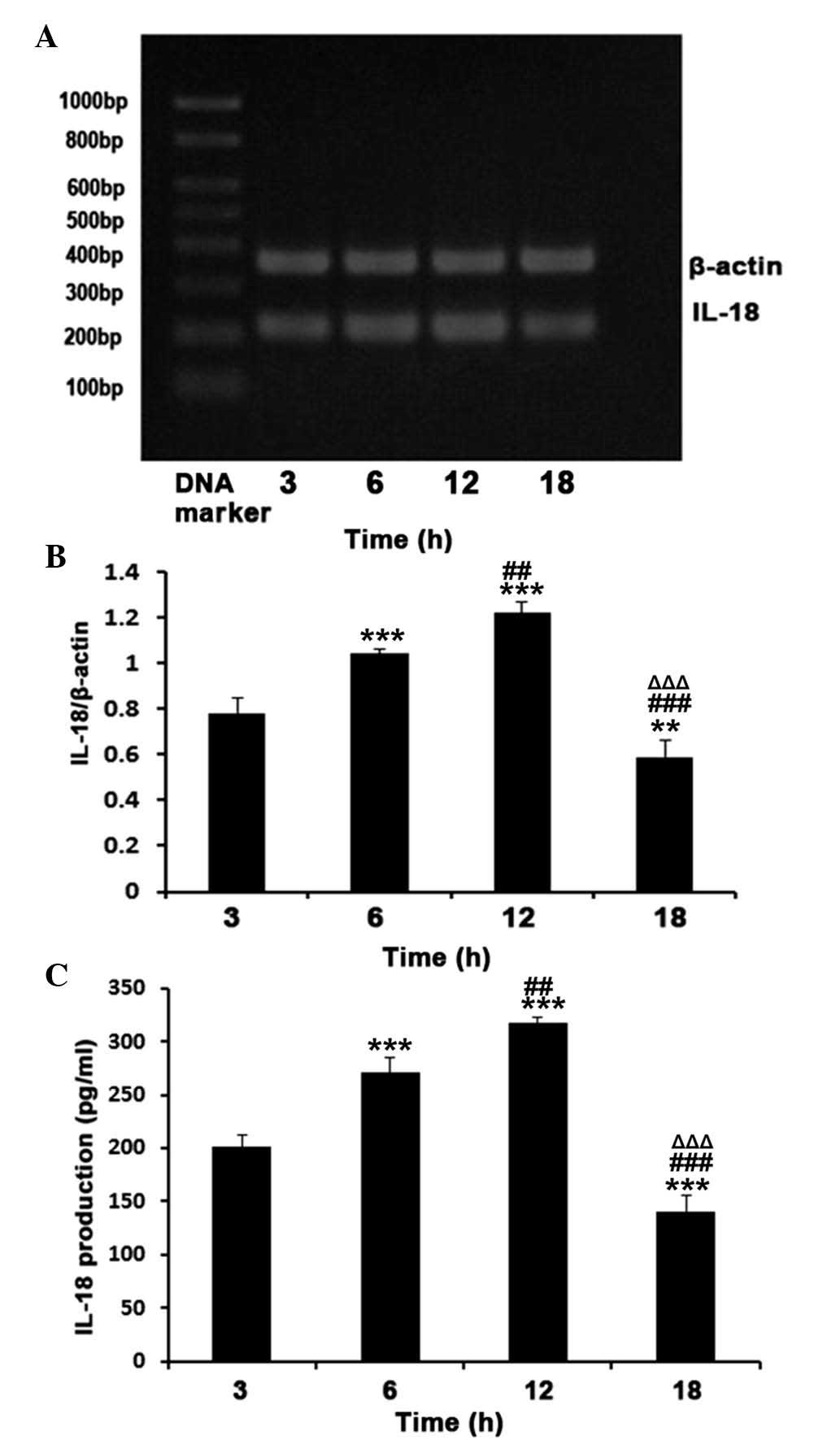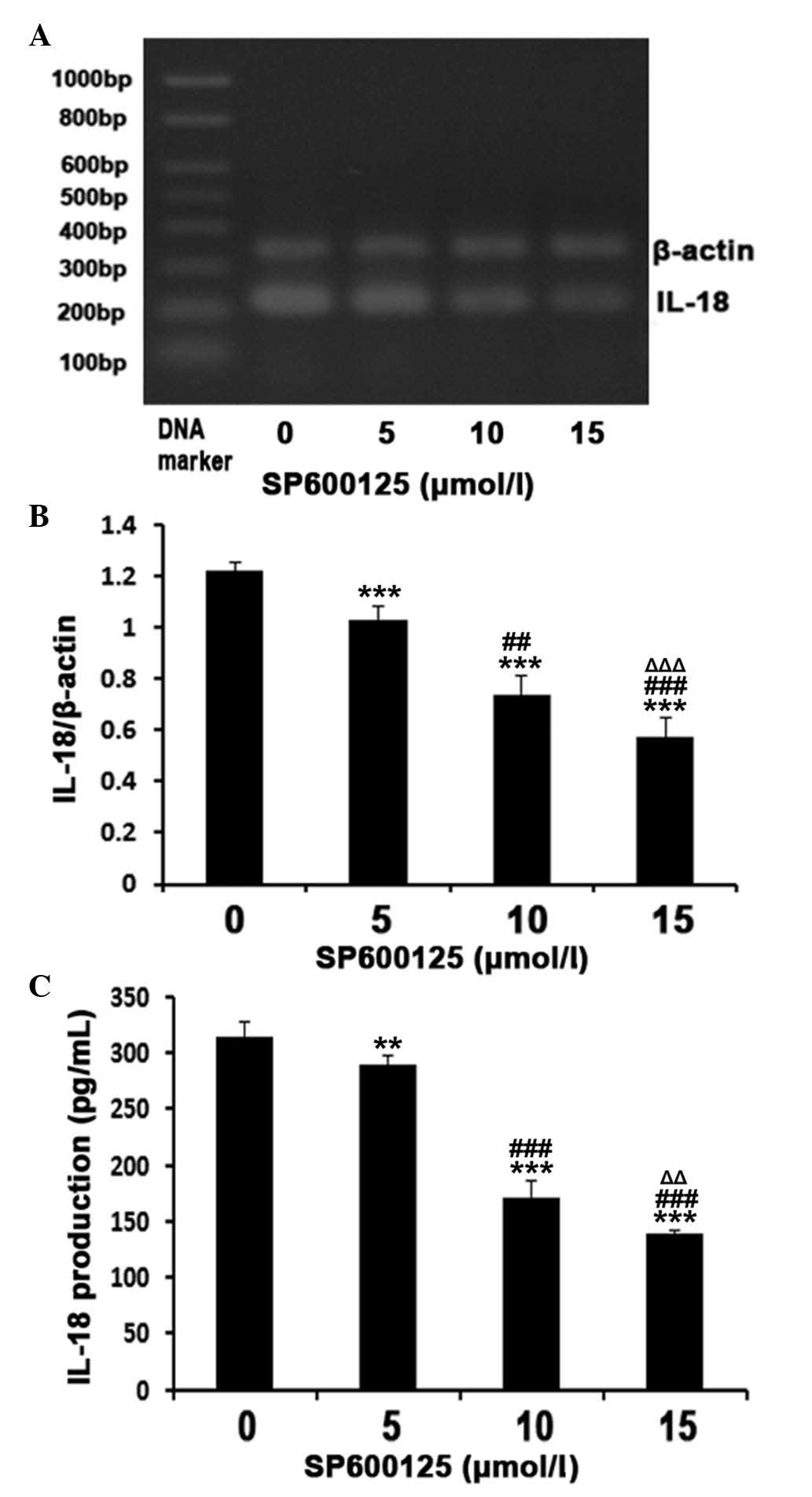|
1
|
Kannel WB and McGee DL: Diabetes and
cardiovascular disease. The Framingham study. JAMA. 241:2035–2038.
1979. View Article : Google Scholar : PubMed/NCBI
|
|
2
|
Haffner SM, Lehto S, Rönnemaa T, et al:
Mortality from coronary heart disease in subjects with type 2
diabetes and in nondiabetic subjects with and without prior
myocardial infarction. N Engl J Med. 339:229–234. 1998. View Article : Google Scholar : PubMed/NCBI
|
|
3
|
Hansson GK: Inflammation, atherosclerosis
and coronary artery disease. N Engl J Med. 352:1685–1695. 2005.
View Article : Google Scholar : PubMed/NCBI
|
|
4
|
Shalhoub J, Falck-Hansen MA, Davies AH and
Monaco C: Innate immunity and monocyte-macrophage activation in
atherosclerosis. J Inflamm (Lond). 8:92011. View Article : Google Scholar
|
|
5
|
Formigli L, Manneschi LI, Nediani C, et
al: Are macrophages involved in early myocardial reperfusion
injury? Ann Thorac Surg. 71:1596–1602. 2001. View Article : Google Scholar : PubMed/NCBI
|
|
6
|
Herskowitz A, Choi S, Ansari AA and
Wesselingh S: Cytokine mRNA expression in postischemic/reperfused
myocardium. Am J Pathol. 146:419–428. 1995.PubMed/NCBI
|
|
7
|
Lotz M: Interleukin-6. Cancer Invest.
11:732–742. 1993. View Article : Google Scholar : PubMed/NCBI
|
|
8
|
Wen Y, Gu J, Li SL, et al: Elevated
glucose and diabetes promote interleukin-12 cytokine gene
expression in mouse macrophages. Endocrinology. 147:2518–2525.
2006. View Article : Google Scholar : PubMed/NCBI
|
|
9
|
Nakanishi K, Yoshimoto T, Tsutsui H and
Okamura H: Interleukin-18 is a unique cytokine that stimulates both
Th1 and Th2 responses depending on its cytokine milieu. Cytokine
Growth Factor Rev. 12:53–72. 2001. View Article : Google Scholar : PubMed/NCBI
|
|
10
|
Hoshino T, Kawase Y, Okamoto M, et al:
Cutting edge: IL-18-transgenic mice: in vivo evidence of a broad
role for IL-18 in modulating immune function. J Immunol.
166:7014–7018. 2001. View Article : Google Scholar : PubMed/NCBI
|
|
11
|
Pope RM and Tschopp J: The role of
interleukin-1 and the inflammasome in gout: implications for
therapy. Arthritis Rheum. 56:3183–3188. 2007. View Article : Google Scholar : PubMed/NCBI
|
|
12
|
Hoshino K, Tsutsui H, Kawai T, et al:
Cutting edge: generation of IL-18 receptor-deficient mice: evidence
for IL-1 receptor-related protein as an essential IL-18 binding
receptor. J Immunol. 162:5041–5044. 1999.PubMed/NCBI
|
|
13
|
Tsutsui H, Nakanishi K, Matsui K, et al:
IFN-gamma-inducing factor up-regulates Fas ligand-mediated
cytotoxic activity of murine natural killer cell clones. J Immunol.
157:3967–3973. 1996.PubMed/NCBI
|
|
14
|
Esposito K, Pontillo A, Ciotola M, et al:
Weight loss reduces interleukin-18 levels in obese women. J Clin
Endocrinol Metab. 87:3864–3866. 2002. View Article : Google Scholar : PubMed/NCBI
|
|
15
|
Hung J, McQuillan BM, Chapman CM, et al:
Elevated interleukin-18 levels are associated with the metabolic
syndrome independent of obesity and insulin resistance.
Arterioscler Thromb Vasc Biol. 25:1268–1273. 2005. View Article : Google Scholar : PubMed/NCBI
|
|
16
|
Escobar-Morreale HF, Botella-Carretero JI,
Villuendas G, et al: Serum interleukin-18 concentrations are
increased in the polycystic ovary syndrome: relationship to insulin
resistance and to obesity. J Clin Endocrinol Metab. 89:806–811.
2004. View Article : Google Scholar : PubMed/NCBI
|
|
17
|
Fischer CP, Perstrup LB, Berntsen A, et
al: Elevated plasma interleukin-18 is a marker of
insulin-resistance in type 2 diabetic and non-diabetic humans. Clin
Immunol. 117:152–160. 2005. View Article : Google Scholar : PubMed/NCBI
|
|
18
|
Thorand B, Kolb H, Baumert J, et al:
Elevated levels of interleukin-18 predict the development of type 2
diabetes: results from the MONICA/KORA Augsburg Study, 1984–2002.
Diabetes. 54:2932–2938. 2005. View Article : Google Scholar : PubMed/NCBI
|
|
19
|
Yamaoka-Tojo M, Tojo T, Wakaume K, et al:
Circulating interleukin-18: A specific biomarker for
atherosclerosis-prone patients with metabolic syndrome. Nutr Metab
(Lond). 8:32011. View Article : Google Scholar
|
|
20
|
Blankenberg S, Tiret L, Bickel C, et al:
Interleukin-18 is a strong predictor of cardiovascular death in
stable and unstable angina. Circulation. 106:24–30. 2002.
View Article : Google Scholar : PubMed/NCBI
|
|
21
|
Tiret L, Godefroy T, Lubos E, et al:
Genetic analysis of the interleukin-18 system highlights the role
of the interleukin-18 gene in cardiovascular disease. Circulation.
112:643–650. 2005. View Article : Google Scholar : PubMed/NCBI
|
|
22
|
Hansen AP and Johansen K: Diurnal patterns
of blood glucose, serum free fatty acids, insulin, glucagon and
growth hormone in normals and juvenile diabetics. Diabetologia.
6:27–33. 1970. View Article : Google Scholar : PubMed/NCBI
|
|
23
|
Monnier L, Mas E, Ginet C, et al:
Activation of oxidative stress by acute glucose fluctuations
compared with sustained chronic hyperglycemia in patients with type
2 diabetes. JAMA. 295:1681–1687. 2006. View Article : Google Scholar : PubMed/NCBI
|
|
24
|
Chang CM, Hsieh CJ, Huang JC and Huang IC:
Acute and chronic fluctuations in blood glucose levels can increase
oxidative stress in type 2 diabetes mellitus. Acta Diabetol.
49:S171–S177. 2012. View Article : Google Scholar : PubMed/NCBI
|
|
25
|
Node K and Inoue T: Postprandial
hyperglycemia as an etiological factor in vascular failure.
Cardiovasc Diabetol. 8:232009. View Article : Google Scholar : PubMed/NCBI
|
|
26
|
Rizzo MR, Barbieri M, Marfella R and
Paolisso G: Reduction of oxidative stress and inflammation by
blunting daily acute glucose fluctuations in patients with type 2
diabetes: role of dipeptidyl peptidase-IV inhibition. Diabetes
Care. 35:2076–2082. 2012. View Article : Google Scholar : PubMed/NCBI
|
|
27
|
Azuma K, Kawamori R, Toyofuku Y, et al:
Repetitive fluctuations in blood glucose enhance monocyte adhesion
to the endothelium of rat thoracic aorta. Arterioscler Thromb Vasc
Biol. 26:2275–2280. 2006. View Article : Google Scholar : PubMed/NCBI
|
|
28
|
Sun J, Xu Y, Dai Z and Sun Y: Intermittent
high glucose stimulate MCP-l, IL-18 and PAI-1, but inhibit
adiponectin expression and secretion in adipocytes dependent of
ROS. Cell Biochem Biophys. 55:173–180. 2009. View Article : Google Scholar
|
|
29
|
Gill R, Tsung A and Billiar T: Linking
oxidative stress to inflammation: Toll-like receptors. Free Radic
Biol Med. 48:1121–1132. 2010. View Article : Google Scholar : PubMed/NCBI
|
|
30
|
Davis RJ: Signal transduction by the JNK
group of MAP kinases. Cell. 103:239–252. 2000. View Article : Google Scholar : PubMed/NCBI
|
|
31
|
Kim YM, Im JY, Han SH, et al: IFN-gamma
up-regulates IL-18 gene expression via IFN consensus
sequence-binding protein and activator protein-1 elements in
macrophages. J Immunol. 165:3198–3205. 2000. View Article : Google Scholar : PubMed/NCBI
|
|
32
|
Mallat Z, Corbaz A, Scoazec A, et al:
Interleukin-18/interleukin-18 binding protein signaling modulates
atherosclerotic lesion development and stability. Circ Res.
89:E41–E45. 2001. View Article : Google Scholar : PubMed/NCBI
|
|
33
|
Everett BM, Bansal S, Rifai N, et al:
Interleukin-18 and the risk of future cardiovascular disease among
initially healthy women. Atherosclerosis. 202:282–288. 2009.
View Article : Google Scholar :
|
|
34
|
Arndt PG, Fantuzzi G and Abraham E:
Expression of interleukin-18 in the lung after endotoxemia or
hemorrhage-induced acute lung injury. Am J Respir Cell Mol Biol.
22:708–713. 2000. View Article : Google Scholar : PubMed/NCBI
|
|
35
|
Esposito K, Nappo F, Marfella R, et al:
Inflammatory cytokine concentrations are acutely increased by
hyperglycemia in humans: role of oxidative stress. Circulation.
106:2067–2072. 2002. View Article : Google Scholar : PubMed/NCBI
|
|
36
|
Kim YM, Kang HS, Paik SG, et al: Roles of
IFN consensus sequence binding protein and PU. 1 in regulating
IL-18 gene expression. J Immunol. 163:2000–2007. 1999.PubMed/NCBI
|
|
37
|
Alsaleh G, Suffert G, Semaan N, et al:
Bruton’s tyrosine kinase is involved in miR-346-related regulation
of IL-18 release by lipopolysaccharide-activated rheumatoid
fibroblast-like synoviocytes. J Immunol. 182:5088–5097. 2009.
View Article : Google Scholar : PubMed/NCBI
|
|
38
|
Cordoba-Rodriguez R, Fang H, Lankford CS
and Frucht DM: Anthrax lethal toxin rapidly activates caspase-1/ICE
and induces extracellular release of interleukin (IL)-1beta and
IL-18. J Biol Chem. 279:20563–20566. 2004. View Article : Google Scholar : PubMed/NCBI
|
|
39
|
Zhu J, Krishnegowda G and Gowda DC:
Induction of proinflammatory responses in macrophages by the
glycosylphosphatidylinositols of Plasmodium falciparum: the
requirement of extracellular signal-regulated kinase, p38, c-Jun
N-terminal kinase and NF-kappaB pathways for the expression of
proinflammatory cytokines and nitric oxide. J Biol Chem.
280:8617–8627. 2005. View Article : Google Scholar
|
|
40
|
Yun W and Li C: JNK pathway is required
for TNCB-induced IL-18 expression in murine keratinocytes. Toxicol
In Vitro. 24:1064–1069. 2010. View Article : Google Scholar : PubMed/NCBI
|


















